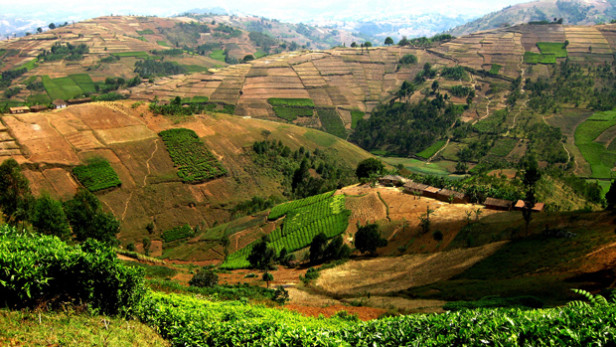Economic Empowerment
Source: Devex
News of soaring demand for land in Africa and the strain this places on rural men and women is not new. Nor is it news that some of the land governance systems on the continent have not sufficiently protected rural communities in the face of heightened demand for land.
But at the conclusion of the first African Land Policy Conference on Nov. 14, the momentum behind land policy reform on the continent is strong and clear.
Just last week, the Land Policy Initiative — a joint initiative of the African Union, the U.N. Economic Commission for Africa and the African Development Bank — launched its Principles for Large-Scale Land-Based Investments, which is certain to spark new policy and laws among African countries at a time when several of them are in the process of historic reforms to their land tenure laws and policies.
Rwanda, for example, has documented land rights for its rural women and men for the first time. Kenya adopted a new constitution in 2010 which protects women’s rights to land and family resources. Uganda adopted in 2013 a new land policy which envisions an overhaul of the current land rights laws, and further establishes land rights for women. Each of these efforts was supported by far thinking donors who understand that if countries don’t get land rights right, their efforts on a host of other priorities — from women’s empowerment to food security — will be frustrated. Donor resources are limited: Every dollar counts and the money won’t last. The question for donors is thus how to best support Africa in securing access to land for rural people at this critical juncture.
From Landesa’s perspective in working on pro-poor land sector reforms in Africa over the past decade, I would like to offer 10 ways that donors can effectively support African governments working to secure access to land for their rural people.

1. Work with governments, the private sector and communities to support healthy and sustainable land sector investments. As the demand for agricultural land in Africa rises, governments are scrambling to develop innovative legal and policy frameworks that ensure investments result in a net benefit to in-country stakeholders, including host communities. The African Union’s Framework and Guidelines for Land Policy in Africa (and the new Guidelines for Large Scale Land Based Investments), the Voluntary Guidelines on the Responsible Governance of Tenure of Land, Fisheries and Forests, and other instruments have highlighted best practice perspectives in land governance. Implementing these guidelines is no easy task. Governments and communities on the front lines of this challenge need technical support.
2. Increase support to Africa’s small and medium-size farms. It is vital for donors, working with governments, to support entrepreneurial smallholder farmers in securing their land tenure, linking up with markets and accessing technical assistance. We have heard donors say that the transaction costs of supporting these farmers — vis-à-vis large-scale and often foreign-owned commercial farms — is too high. But the potential for people-centered agricultural growth in Africa lies with these farmers, and we believe the longer term socio-economic costs of neglecting them is far too high as outlined in this issue brief.
3. Support government efforts to recognize and protect community land rights. Many governments across Africa are developing or implementing laws to formally recognize community and/or customary lands. This is a critical step toward securing land tenure for rural communities. Doing this well, however, is a highly resource-intensive proposition, requiring resources to accurately map and record the lands, and to support best practices in community-based land governance. The risks of not doing this will include igniting conflict both within and between communities, sometimes including transnational conflict.
4. Seek ways to support women’s access and rights to land — as enshrined in the constitutions, laws and policies of many African countries — and support work to ensure that those rights are realized and implemented. Donors interested in socio-economic development can find few greater investments then the economic empowerment of women through secure rights to land.
5. Support government efforts to decentralize land governance at the local level. The trend of decentralization and devolution of land administration and management in many African countries has created the potential for more responsive and transparent governance. However effectively decentralizing and devolving land governance requires time and significant resource outlays.
6. Base programs on a thorough understanding of local needs, priorities, and capacity. Donor programs based on national development strategies and driven by in-country demand will enhance effectiveness, decrease costs and allow for greater coordination. While this sounds simple, it will require a heightened commitment to learning what each country’s priorities are, and a willingness to partner with these countries on the basis of their own unique agendas.
7. Coordinate more effectively with other donors. Within individual countries, donors should better coordinate efforts between themselves so as to ensure that their actions are consistent with government strategies, complementary as opposed to duplicative, appropriately staged and phased, and build off of knowledge gained by other donors.
8. Commit to long-term horizon for land policy reform. Current donor funding models for programs and projects are largely based on a short-term horizon, but development and implementation of effective land policy is a long-term proposition.
9. Invest in robust research and monitoring efforts. Donors could more pro-actively support African country governments in finding local solutions to local needs, through scalable pilot projects, and in closely monitoring and evaluating the impacts of these projects, and ensuring these lessons are shared across the continent.
10. Dedicate resources to capacity building in-country wherever and whenever possible. Donor investments in building human resource capacity in the land sector will have long-term payoffs. Where possible, donors should support training and professional development opportunities for government officials, civil society organizations, farmers’ organizations and others.
